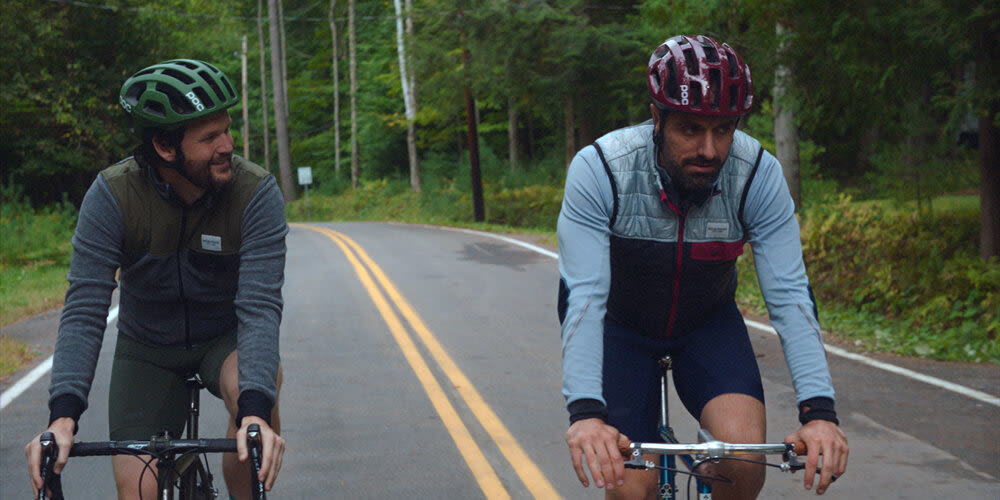The Climb Is a Formally Audacious Buddy Comedy with a Glaring Gender Problem

Kyle Marvin (left) and Michael Angelo Covino in The Climb
Image: Courtesy NW Film Center
Editor's note 11/16/20: This piece was filed two weeks before Governor Brown issued Oregon's initial stay-at-home-order, and three days before the NW Film Center cancelled the remainder of the 2020 Portland International Film Festival. The Climb opened in US wide release on November 13.
There’s something strange about opening a film festival on the brink of a pandemic. The 43rd annual Portland International Film Festival kicked off on Friday with dual screenings: Lara Jean Gallagher’s Clementine at the Whitsell Auditorium and Michael Angelo Covino’s The Climb at Cinema 21. Friday was also the day the city of Austin announced it would cancel SXSW out of coronavirus concerns.
NW Film Center director Amy Dotson introduced The Climb, teasing finger-heavy shareables at the afterparty (cupcakes and popcorn, quite the pairing) and touting the film’s star/cowriter Kyle Marvin’s Portland roots. “I used to see movies here,” he marveled when Dotson passed him the mic, glancing up to Cinema 21's balcony. “This is wild.”
Marvin and Covino are longtime friends, and The Climb is loaded with “my buddy and I made a movie” vibes. It originated as a short that screened at Sundance in 2018; Marvin and Covino quickly expanded it into a feature, which Sony Pictures Classics picked up after it premiered at Cannes last May. It’ll open in earnest on April 10 at Cinema 21 and expand to other theaters across the city the following week.
In The Climb, the pair play codependent childhood friends who circle one another’s lives over rapidly passing years. The film opens on a simple, loaded image, shot in a showy but impressive single take. The pair is biking up a hill in France, and Mike (the characters and performers share first names) reveals that he's been sleeping with Kyle’s fiancée. From here, the film makes its first time jump and reveals an atypical structure: what first scans as a Sundance-y mumblecore document is actually a picaresque series of vignettes divided by twee title cards—a treatise on male friendship that's more Jules and Jim than Drinking Buddies.
First, the good news. The Climb is a comedy, and the jokes land. Covino and Marvin’s repartee is incredibly natural, and Covino's real skill for pace and structure means the laughs come from unexpected reversals or surprising plot developments more often than pithy one-liners. It’s called The Climb and never once nods to Miley Cyrus, for example.
You only wish Covino and Marvin would have approached their female characters with similar care. The Climb is a buddy comedy, and a successful one, but in its slightly heightened world, women are either prizes, angry mothers, strippers, or harpies. The film’s ostensible stance on the hard-drinking, self-absorbed Mike is that he’s A Good Guy, Deep Down, but The Climb doesn’t do enough to separate itself from the qualities it condemns in him. The first conflict is over a promiscuous woman who gets three lines and promptly dies; then there's Kyle's eventual wife (Gayle Rankin), a widely hated control freak. However glib it may be to evoke the Bechdel test, The Climb only passes it when two women side-eye Rankin.
This would be troubling enough on its own, but it indicates another, broader problem with The Climb. Covino regularly nods to the masters with his camera and his storytelling techniques—at a post-screening Q&A he namechecked Truffaut and Varda—but the film’s roots as a Sundance short are visible. If, as a feature, The Climb frequently engaging, it can also feel like its striking style is a cover for its fundamentally conservative ideas. Men could be friends if women wouldn't get in the way; life is an uphill battle and you need a buddy by your side, no matter how badly he's behaved. You sense Truffaut wouldn't find much unusual about the way the characters in The Climb think.
Still, it’s not a wholly sour experience. The soundtrack is full of ebullient French pop, and Covino's whimsical touches—the long takes, the a cappella interludes—are sincerely fun. They don't often enhance the central friendship between Mike and Kyle, which remains the engine of the film, but then Marvin and Covino's natural chemistry doesn't need much enhancing.
The characters don’t grow, exactly. At least not much. They travel a long distance (at least a decade passes in the film’s six acts), but the incline is slight. You get the sense they’ve learned their lesson by the time the credits roll, but only just.
And maybe that’s the idea. After all, there’s always gonna be another mountain.




